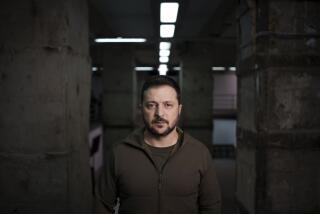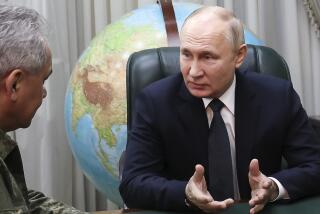Yeltsin ‘Fine,’ Visits Disputed Black Sea Fleet
- Share via
MOSCOW — A day after canceling all his appointments and vanishing from Moscow, Russian President Boris N. Yeltsin reappeared Tuesday in the southern port of Novorossiysk, where he met with commanders of the Black Sea Fleet amid signs of serious political trouble in the armed forces.
Pavel Voshchanov, the president’s press secretary, explained after more than a day of speculation about Yeltsin’s activities and health that the Russian leader had wanted to assess plans for the fleet’s nuclear disarmament before his summit meetings this week at the United Nations and in Washington and London.
Yeltsin, who has suffered from heart ailments and periods of acute depression, is “alive, healthy and is feeling fine,” Voshchanov said.
The Russian president returned to the capital Tuesday night, a government spokesman said, and he will meet Secretary of State James A. Baker III this morning in the Kremlin as scheduled.
In a television report from the cruiser Moskva, the fleet’s flagship, Yeltsin did appear hale and hearty--and quite interested in the ship’s armaments and electronic equipment. He was shown being warmly welcomed by the Moskva’s officers and men.
But accompanying reports in the Russian news media implied that political grumbling is growing in the armed forces, particularly the navy, as Ukraine and other republics press their claims to such key units as the Black Sea Fleet and the officers resist division of what they regard with pride as the last remaining asset of the old Soviet Union.
Yeltsin seemed, in fact, to be on a political peacemaking mission in Novorossiysk, reassuring the officers that the fleet will remain a united, strategic force defending the Commonwealth of Independent States as the Soviet Union’s successor but insisting they subordinate themselves to new leadership.
“The president was once again assured that our position remains unchanged,” Adm. Igor Kasatonov, the Black Sea Fleet commander, said later. “The Black Sea Fleet is indivisible.”
Although the initial result of Yeltsin’s reappearance Tuesday was to calm fears about his health, it raised new concerns about Russia’s political stability. What was ultimately portrayed as a routine familiarization trip for Yeltsin was evidently far more important than the two days of appointments that he had canceled in Moscow.
Yeltsin’s action--and the confused, conflicting and erroneous explanations given by Russian officials Monday--drew sharp criticism from a leading Moscow newspaper. Nezavisimaya Gazeta asked whether such unpredictability would characterize the new government.
“The sudden exhaustion of President Yeltsin and the unexpected change in his work schedule . . . gradually are becoming more accepted as a part of Russian political life,” the newspaper wrote, referring to the government’s original explanations that Yeltsin was resting at a country house while he prepared for his trip.
“We need now to ask about this, regardless of the previous categorical statements by the chief of the presidential press service that Yeltsin ‘is in wonderful physical condition.’ ”
The press comments are certain to be even harsher today as Russian journalists demand to know why they were misled by government officials. Civilian journalists also were barred from Yeltsin’s meetings aboard the 25-year-old Moskva and other vessels at Novorossiysk.
“Whatever the intent, the effect of Yeltsin’s disappearance and trip to Novorossiysk has been to show his government as confused and befuddled and to dramatize its political fragility,” a onetime adviser to former Soviet President Mikhail S. Gorbachev commented. “It’s hard to say what they wanted to do, but it’s quite easy to see what a mess they made of it.”
Russian diplomats preparing for Yeltsin’s trips to London, New York, Washington and Ottawa this week and to Paris next week said they are seriously concerned about the loss of much of the dramatic impact they had hoped for.
“Everyone will be looking and sniffing to see whether he has been drinking,” one accomplished Moscow “spin doctor” commented Tuesday. “Nobody is going to listen to what he has to say, nobody will be interested in what Russia is proposing, only whether Yeltsin is going to last.”
Andrei V. Kozyrev, the Russian foreign minister, said Tuesday that Yeltsin will disclose a series of new foreign policy and disarmament initiatives during his talks abroad this week.
Voshchanov said Yeltsin made the Black Sea trip to prepare for his meetings this week on “the problems of nuclear security” with British, Canadian and U.S. leaders and with the U.N. Security Council.
But the Russian president may well have also been securing his political flanks for important disarmament initiatives that will follow on those of President Bush and Gorbachev last autumn.
Measures under consideration now call for much deeper cuts, including cuts in the strategic arsenals of Russia and its allies in the Commonwealth and of the United States, and Yeltsin may well have wanted to win the visible approval of the most restive section of his military before proceeding with unilateral or coordinated actions with Washington.
Accompanied by Air Marshal Yevgeny I. Shaposhnikov, commander in chief of the Commonwealth forces, and Adm. Vladimir Chernavin, commander of its navy, Yeltsin appeared from the television report of his visit to the Moskva to have been emphatic in making a number of points.
“In a short and fruitful conversation, we managed to discuss and find acceptable solutions to many problems,” said Kasatonov, the Black Sea Fleet commander.
The number of ships that sailed to Novorossiysk to meet Yeltsin was not disclosed but appeared from the television report to be considerable. The fleet is mostly based at nearby Sevastopol, Ukraine, and Russian officials denied Tuesday that Yeltsin was seeking to move it to Novorossiysk.
According to reports from Novorossiysk, Yeltsin defended the fleet against claims from Ukraine, which wants a sizable portion of its ships and shore facilities--all those that are not nuclear or strategic. He pledged that the fleet would remain a united naval force under the Commonwealth of Independent States, which groups Russia, Ukraine and nine other former Soviet republics.
Yeltsin is scheduled to leave Thursday morning for London, then travel to New York to attend a U.N. Security Council session Friday.
More to Read
Sign up for Essential California
The most important California stories and recommendations in your inbox every morning.
You may occasionally receive promotional content from the Los Angeles Times.










